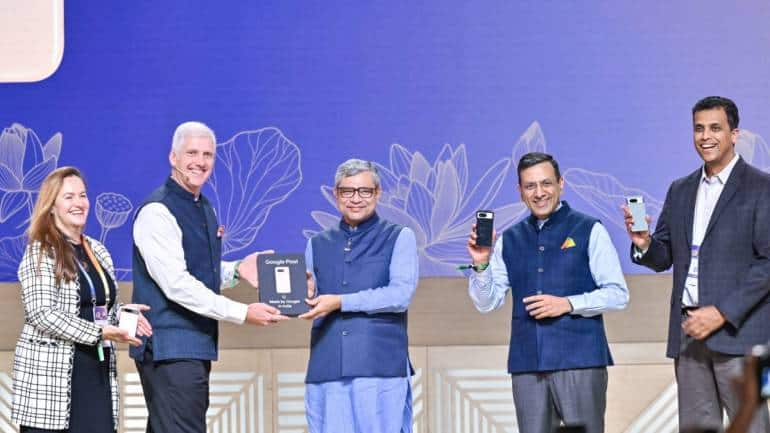
GOOGLE TO EXPORT INDIA-MADE PIXEL SMARTPHONES TO EUROPE, US; TRIAL PRODUCTION BEGINS
Google is looking to establish India as a key export hub for its Pixel range of smartphones for markets in Europe and the United States and will soon start commercial production through Foxconn and Dixon subsidiary Padget Electronics, sources said.
It has already launched trial production in Tamil Nadu with Foxconn, also a major maker of Apple devices, sources said.
“Google is a large brand, which Dixon will add to its customer list in the second half of the year through its partnership with Compal. They will share the production with Foxconn,” a source privy to the discussions told Moneycontrol.
The base variant would be made by home-grown Dixon Technologies, while Foxconn would be responsible for Pro variants, the source said.
“Google will make a formal announcement in H2... they are committed to India. The initial plan is to serve Europe and going forward Google will address demand in the US with India-made Pixel smartphones,” the person added.
Made-in-India Pixels for Europe, US
The commercial production would start in September and the export would begin once the production stabilises, the person said.
“Since demand for Pixel smartphones is very low in India, Google plans to export most of the locally produced devices from Foxconn and Dixon facilities leveraging the PLI benefits,” another source said, referring to the government’s production-linked incentive programme aimed at giving manufacturing a boost.
Queries sent to Google didn’t elicit any response. Dixon declined to comment.
“Thank you for your inquiry. As a matter of company policy, we do not comment on specific customers. We are committed to maintaining the privacy and confidentiality of all our customers and ensuring the highest standards of service and support," Foxconn group company Bharat FIH said in a statement to Moneycontrol.
Chief Minister MK Stalin recently said Foxconn would make Google’s Pixel smartphones in Tamil Nadu.
“As a result of the negotiations, Google will partner with Foxconn in Tamil Nadu to produce the Pixel cellphones and has offered to set up a factory,” Stalin said in a statement.
Foxconn has two facilities in Tamil Nadu. It assembles Apple's iPhones at its unit near Chennai.
Tarun Pathak, research director at Counterpoint Research, said like other global electronics companies, Google aims to diversify manufacturing. India presents itself as a preferred destination with low labour costs and a huge aspirational local smartphone market.
India, the new battlefield for tech giants
Pixel had just 0.04 percent share of the Indian smartphone market in the March 2024 quarter, Counterpoint Research data shows.
In the premium segment, Pixel's share was below a percent. With local manufacturing, it can aim for 1.5 percent share, Counterpoint estimates.
Read: Google to scale up its Pixel smartphone business in India amid a booming premium market
With Made-in-India phones, the brand would be able to offer discounts and gain some market share, Pathak said.
"Not only the Make in India efforts from Google Pixel will help them in gaining a share in the Indian market, the Made in India Pixel smartphones will likely be exported, further boosting India’s smartphone exports," he said.
It was in October that Google announced plans to manufacture Pixel phones in India, starting with Pixel 8 and 8 Pro.
The initiative would help it make Pixel smartphones more widely available across the country, with the first devices expected to roll out sometime in 2024, the tech giant had said.
“India is a priority market for Pixel smartphones, and we’re committed to bringing the best of our hardware and underlying built-in software capabilities to people across the country," it said.
Google’s rival Apple has been aggressively ramping up production of its flagship iPhone devices in India. It assembled $14 billion worth of iPhones in the country in FY24.
About one in seven, or 14 percent, iPhones are now made in India. Apple plans to take it to 25 percent over the next three to four years.
2024-07-04T05:59:59Z dg43tfdfdgfd